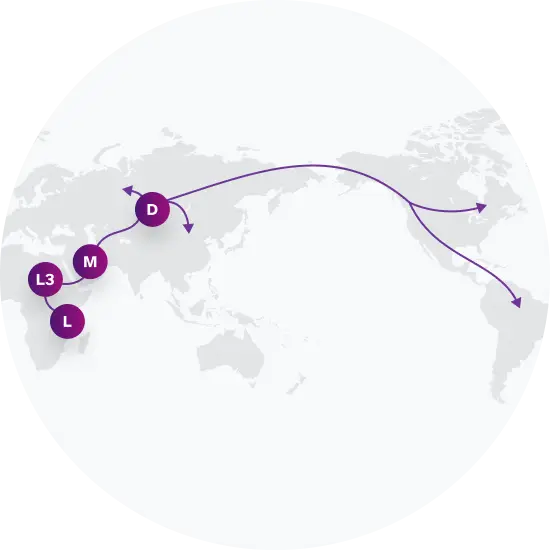Haplogroup D1
What is Maternal Haplogroup D1?
Haplogroup D1 is a genealogical group of lineages defined by unique genetic markers present in your mitochondrial DNA, which is transmitted from your mother. Your maternal haplogroup paints a picture of your ancient origins and the migrations of your ancestors. Although your maternal haplogroup reflects just one of your many ancestral lineages, it carries information about that lineage over tens of thousands of years.
Haplogroup D1 is descended from haplogroup D. Among 23andMe research participants, haplogroup D1 is commonly found among populations in Mexico.
It's important to note that your haplogroup doesn't define your current ethnic identity; rather, it provides an insight into your deep ancestry on the maternal side.
 Maternal Haplogroup Origins D
Maternal Haplogroup Origins DTop Surnames with Haplogroup D1
For surnames with sufficient representation in the data, these percentages represent the frequency with which each surname is found in individuals exhibiting this genetic marker.
Haplogroup D1 is linked to Naia
One tragic day over 12,000 years ago, a malnourished teenage girl wandered through a massive cave system in Mexico's Yucatan Peninsula and fell into a sinkhole, breaking her hip. Over the next few thousand years, sea levels rose and water filled the cave, submerging the girl's delicate skeleton. When divers finally chanced upon her remains in 2007, they named her "Naia" after the water nymphs of Greek mythology. From the bone samples, researchers determined that she carried maternal haplogroup D1, a lineage that is still relatively common in Central and South America. Despite genetic similarities, however, they found that Naia's features looked very different from her modern counterparts, suggesting that the facial structure of Native Americans has changed significantly since their arrival in the Americas.
 Naia © Timothy Archibald 2016
Naia © Timothy Archibald 2016